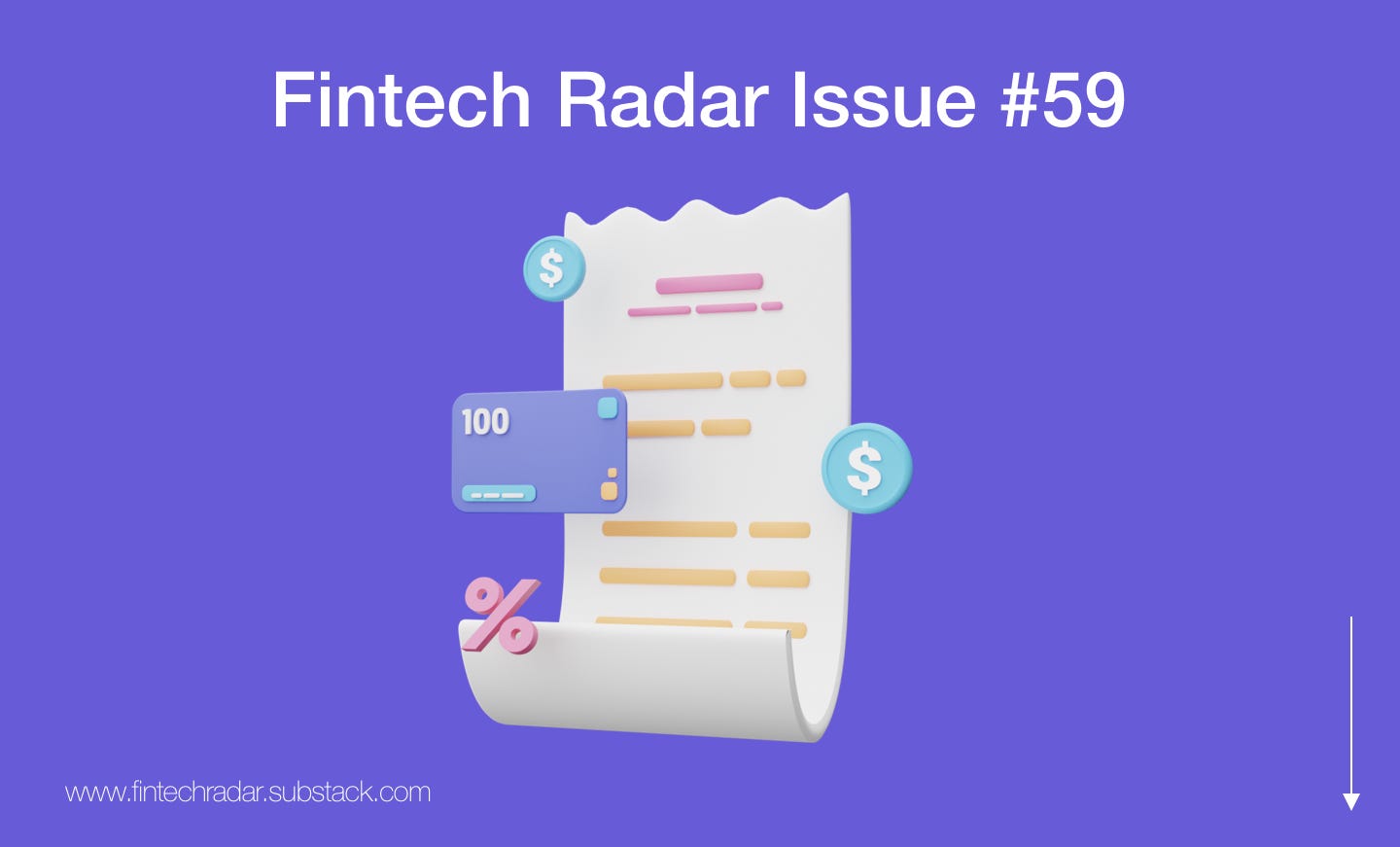
Discover more from Fintech Radar
Issue #59: Unit Secures The Bag, Stripe Gets Into The Identity Game And JP Morgan Chase Acquires Nutmeg
👋 Hi, FR fam. I hope you’ve all had a great start to the week.
As always there’s plenty of news in the world of fintech for us to discuss, so let’s get straight into this week’s News Grab Bag.
📣 The News Grab Bag
The best fintech deal that never happened ⚬ What’s the Defi infrastructure landscape look like? ⚬ Brazil’s Central Bank pushes back its plans for a CBDC by Two Years ⚬ Adyen lands a bank charter in the US ⚬ Fintech lending is on the rise and so are defaults ⚬ Building while flying ⚬ Wise plans to go public directly in London ⚬ Aussie banks go down ⚬ AFIN is launching a new digital currency sandbox ⚬ What does the NFT Ecosystem look like after the Boom? ⚬
📈 Notable Funding Announcements
It was another big week of funding announcements in the world of fintech. In total, 60 funding rounds were announced, totalling $3.7b.
This week I thought I’d highlight two funding rounds that, I think, illustrate how the market for banking infrastructure has evolved in a few short years.
💳 Unit Raises $51m As Part of A Series B Round of Funding →
BaaS provider, Unit, last week announced they’d closed a $51m series B funding round. Accel led the round with participation from existing investors, Better Tomorrow Ventures, Aleph, Flourish Ventures, and TLV Partners.
🤓 My Take: It’s becoming almost a weekly occurrence that a BaaS startup announces a funding round. The growth we see in the segment is driven by the increased demand for solutions that stitch together the complex financial fabric that a company has to navigate if it wants to offer financial products to its customers. After all, every company is now a fintech, but few actually want to touch the corroded pipes of the financial system.
When looking at the competitive landscape in BaaS, it’s clear that there is a developing bifurcation between the first wave of players and the latest generation of BaaS providers taking a more bottom-up approach to distribution. Just as Twillio pioneered the developer-centric bottom-up approach to distribution in communications, we’re seeing BaaS providers (finally) start to follow suit. This new wave of BaaS players are providing (gasp) transparent pricing and the ability to go from idea to prototype without having to speak to a salesperson (yuck!).
Don’t get me wrong, there’s always going to be a need for sales support in complex infrastructure sales. However, the overall level of friction required to get up and to go is falling, and the gap between the legacy players and the new wave of BaaS providers is really starting to become evident. For example, companies like Unit, Apto, and Lithic now allow prospective customers to instantly spin up cards and accounts, all without needing to speak to a sales rep. At the same time, other unnamed BaaS providers (and there are still plenty of them) still make you speak to sales teams in other time zones to simply access API documentation. I know which companies I prefer to deal with.
🏦 10x Future Technologies Raises $187M
Last week, core banking provider 10x Future Technologies announced they’d closed a $187m Series C round of funding. The round was co-led by BlackRock and Canada Pension Plan Investment Board (CPP Investments), with participation from existing investors JPMorgan Chase, Nationwide, Ping An and Australia’s Westpac.
🤓 My Take: 10x might not be a name you recognise, but it seems they’re plenty busy doing large top-down core banking transformations.
If the name doesn’t ring a bell, it’s probably because they tend to sell to incumbent banks. Part of 10x’s value proposition is that they offer a more modern modular core banking solution (actually a Supercore™ — yes, literally that’s what they call it, and apparently they’ve trademarked it). If you’re at a bank, that’s great. You can add “Supercore” to the deck you need to present to senior leadership and be done with it. So maybe the branding makes sense 🤷♂️ Beyond core banking, 10x also provides BaaS infrastructure and recently helped Westpac spin up their BaaS proposition, which Afterpay uses in Australia to power their consumer accounts.
At one end of the spectrum, we see the likes of Unit start to offer fully-fledged banking infrastructure available on a self-service basis. In contrast, at the other extreme, we see plenty of traction at the top end of town for core banking infrastructure transformation at banks. It seems, regardless of which end of the spectrum you target, there’s still plenty of work to be done — not a bad time to be offering pick and shovels to the finance industry.
☝️ Things You Should Know About
Last week JP Morgan Chase announced they’d be acquiring UK wealth management platform, Nutmeg.
As a reminder, JP Morgan Chase has plans to launch a UK challenger bank. The press release announcing the Nutmeg acquisition hinted that this might form part of the UK challenger bank proposition.
We are building Chase in the U.K. from scratch using the very latest technology and putting the customer’s experience at the heart of our offering, principles that Nutmeg shares with us. We look forward to positioning their award winning products alongside our own, and continuing to support their innovative work in retail wealth management.
As you may recall, the last two times JP Morgan tried their hand at challenger banking, it didn’t go all that well — both Finn and Bó were unceremoniously sent to the scrap heap not long after launch.
Hopefully, the Nutmeg acquisition signals that JP Morgan has figured out that going it alone vs partnering (or, in this case, acquiring) isn’t all that great idea for an incumbent bank.
🆔 Stripe Gets Into The Identity Game →
Last week Stripe announced the launch of a really interesting new identity product. I don’t think many saw this product launch coming. I know I didn’t. However, ex-post launch, it feels obvious that Stripe should be offering a KYC product.
The new product supports three types of verification checks at its core: document, selfie, and ID number. This allows companies to do KYC all via Stripe’s API by calling some new endpoints. Super clever and a great product extension.
Looking at the initial use cases outlined in the press release, it seems the product is aimed at what I’ll call ‘KYC light’ use cases — which I think taps into an underserved market. Take, for example, the Discord use case mentioned in the press release — where Discord is using the product for embedded identity verification to ensure trustworthiness on the platform. Of course, there’s no strict KYC requirement that Discord is trying to meet with this implementation, still, it’s a great way to enhance trust on the platform. This kind of thing has traditionally been a pain in the ass to implement as most of the options on the market are overkill, mainly because they’re not designed for this kind of implementation — but this is exactly where I think Stripe’s identity product will shine.
In its current form, I can’t see this competing with the like of Onfido (it’s just too lightweight), but it’s well-positioned to meet the needs of companies wanting to further drive down fraud or verify users in a more robust way.
🛒 Shop Pay Now Available To Every Merchant Selling On Facebook And Google
Shopify continues to expand Shop Pay and last week added it for use on Facebook and Google.


As I’ve written about in previous FR issues, the checkout wars have started to heat up with several players vying for checkout button supremacy. Shopify’s strategy of being available on every platform is ingenious as it continues to raise the bar for competitors — i.e. why would you use Bolt or Fast when their offerings don’t support every channel that Shop Pay does? The answer is you wouldn’t.
Watch this space. It’s sure to continue to be hotly contested. May the best button win!
🎧 Podcast Recommendations
This week’s podcast recommendations cover both consumer and B2B fintech, so regardless of whether you’re into the picks and shovels of fintech or the customer-facing side of things, I’ve got you covered. Enjoy.
🏳️🌈 Addressing the LGBTQ Wealth Gap ft. Billie Simmons, Co-Founder & COO of Daylight → Daylight, is a challenger bank focused on the LGBTQ community. In this podcast, Daylight’s founder discusses why they started a bank for the LGBTQ community and the specific challenges the segment faces when they’re interfacing with the traditional financial services industry. I highly recommend this podcast; it’ll make you realise how poorly the sector currently caters to people outside the norm.
📊 Good Time Show with Plaid CEO Zach Perret → In this episode of the Good Time Show, Zach Perret joins the A16Z team to discuss the roller coaster ride that was Visa’s failed acquisition of Plaid. We well worth a listen to hear the story from Zach himself.
❤️ Show Some Love For FR
📈 You can check out Radar, an open database of Australia's fintech ecosystem. You can find it here → 📡 SideFund Radar
📧 Feel free to reach out if you want to connect. I'm me@alantsen.com and @alantsen on the Twitters.
Ps. If you like what I'm doing with FR, please feel free to share it on your social disinformation network of choice. I'd also appreciate it if you forwarded this newsletter to a friend you think might enjoy it.
🙏 What did you think of this week's issue of FR?
I love it! ◌ I Like It ◌ Not Bad ◌ I Don’t Like It ◌ It’s Awful
Subscribe to Fintech Radar
Fintech Radar is a weekly missive about all that's happening in the world of fintech.





